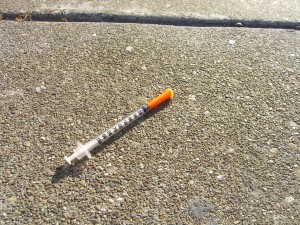The rise in drug use in the Matanuska-Susitna Borough is prompting community action against addiction, and local health officials say that counteracting the spread of drug use is everybody’s business.

Mat-Su Health Foundation sponsored a community discussion Monday evening, centered on the problems of drug and alcohol addiction.
A panel of medical, law enforcement and behavioral health experts gathered to answer questions from a live audience on how communities can address the growing rate of addiction.
The personal devastation of heroin use was illustrated poignantly through voices on a video prepared by the Health Foundation:
“Substance abuse has affected my life since I was a child”, one woman said. “It caused me to get a 20-year prison sentence.”
Other voices chimed in “… not knowing where my son is, whether he is alive or dead” … “well my brother is also an addict, his children’s mother is an addict, so we are raising our nieces and nephews as well”…. “I have no words, I can’t explain the feeling, the hopelessness” …” I can remember a friend telling me the first time I tried oxycodone, ‘don’t do it, because you will never go back to anything else.’ When the pills ran out, I turned to heroin…”
Heroin in the Mat-Su-HD from matsuhealthfoundation on Vimeo.
According to a Health Foundation survey, Mat-Su heroin use is about twice the national average — 0.4 percent of residents use heroin. Alaska State Trooper Joe Minor, who works graveyard shift along with a K-9 partner, says 70 percent of his law enforcement activity is linked to drug abuse.
“Any night of the week, right now, within seven to ten traffic stops, I can find heroin.”
Although heroin is cheaper than oxycodone, Minor says current street prices for a tenth of an ounce of the drug actually make heroin more expensive than gold.
“I’ve never found a burglary that wasn’t linked to drugs, I’ve never found a robbery that wasn’t linked to addiction of some sort.”
Dr. Jay Butler, the state’s chief medical officer, told the audience that inappropriate use of opiate pain killers, and use of heroin, has doubled in the past decade nationally, and that Alaska is not immune to the epidemic. And, Butler says, opiate addiction is viewed now as a public health problem, where as earlier it was labeled a behavioral health problem.
Dr. Melissa Kemberling, director of programs at the Health Foundation, and a trained epidemiologist, says the role of alcohol abuse should not be overlooked in heroin addiction.
“Alcohol is the drug that wreaks the most havoc in our community. And we don’t have adequate treatment for alcohol abuse and treatment, as well as the other drugs.”
“Of the 14 overdose deaths that have occurred from 2008 to 2015 in Mat-Su, about half of them had alcohol involved.” Kemberling says.
She says about 6,200 adults in Mat Su are either in drug abuse treatment, or should be. And more than 700 youth are at risk for becoming addicted to drugs.
But are there enough treatment facilities in the Mat-Su? Kemberling says no.
“We have no detox in the Valley. We have 14 beds in Anchorage, and that is not adequate for the whole Southcentral population.”
Those beds are at the Ernie Turner Center, which is operated by Cook Inlet Tribal Council. Rebecca Ling with CITC says it costs about $500 a day for one detox bed, and funding cuts have reduced the availability of those beds.
Alcohol detox is a life-threatening process, and must be medically monitored, but heroin detox is not life threatening. Kemberling says many heroin addicts can be treated as outpatients, but as it is, the response to Mat-Su drug users in crisis is provided by non-profits, which receive state grant funding.
“The services exist or not, depending on whether or not they get funded, not on the needs of our residents.”
Bradley Grigg, a treatment and recovery manager with the state’s division of behavioral health, says that state grants fund opioid treatment services and detox beds. He says of the $65 million in statewide treatment and recovery grants spent this year, $28 million went to substance abuse services. And he says his department’s budget has diminished by $9 million since 2008.
Access to residential treatment for recovering addicts is limited in Mat Su as well. One facility, Nugen’s Ranch, has 26 beds for recovering addicts, but none for those needing to detoxify before entering treatment.
Kemberling says the various threads of response to addiction don’t always weave together. She says the Health Foundation can work as a coordinator of the complex network of crisis response, medical treatment and behavioral therapy necessary to help an addict recover.
The Health Foundation has published two reports assessing Borough health needs pointing to substance abuse as the number one target. Kemblering says a third report will address prevention.
“Nobody focused upstream on prevention, and that is where we think we can come in as well, to make sure they don’t develop these addictions. A lot of our work is to try to address child maltreatment, which can lead to substance abuse later in life.”
Addiction is how many people deal with pain, and the childhood trauma that causes it. She says, “We have to start dealing with the pain.”
APTI Reporter-Producer Ellen Lockyer started her radio career in the late 1980s, after a stint at bush Alaska weekly newspapers, the Copper Valley Views and the Cordova Times. When the Exxon Valdez ran aground in Prince William Sound, Valdez Public Radio station KCHU needed a reporter, and Ellen picked up the microphone.
Since then, she has literally traveled the length of the state, from Attu to Eagle and from Barrow to Juneau, covering Alaska stories on the ground for the AK show, Alaska News Nightly, the Alaska Morning News and for Anchorage public radio station, KSKA
elockyer (at) alaskapublic (dot) org | 907.550.8446 | About Ellen




